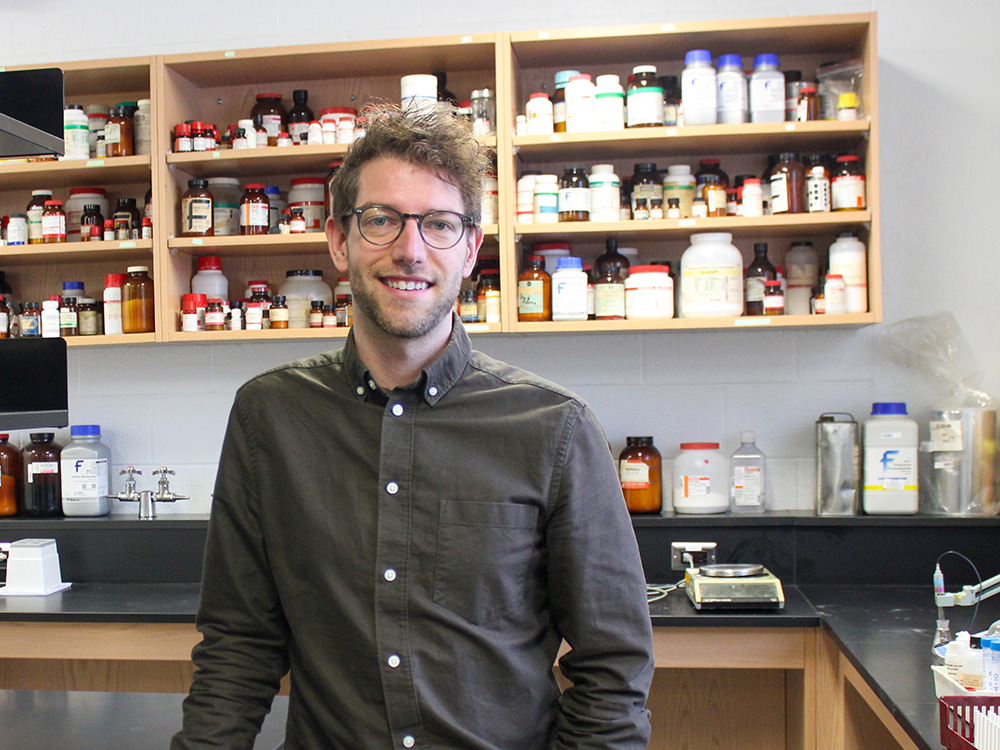Kevin De France explores the design and application of sustainable bio-based materials in fields spanning the biomedical, coatings & packaging, and environmental sectors. An Assistant Professor in the Department of Chemical Engineering, he is particularly interested in cellulose- and protein-based nanomaterial ‘building blocks’, and how they can be used to make composite structures such as hydrogels, aerogels, emulsions, and films.
“In our society, we are exceptionally reliant on a variety of non-renewable plastic products,” he told the Department of Chemical Engineering last year, “which more often than not contribute to increased pollution, generation of waste, and other environmental issues. Quite basically, the aim of my research program is to replace as many of these plastics as possible (such as bags, coatings, and a variety of other consumer products) with natural, recyclable, and ultimately sustainable materials.”
“One of the big challenges in this area is that, from a performance and cost perspective, plastics are really good materials,” he says. “They make our cars lighter and keep our foods fresher. They’re in our clothing, our electronic devices, and life-saving biomedical equipment. They’re even in our shampoo! But eventually they also end up in our landfills and contribute to pollution in our water and air. What my research program is trying to do is develop materials from natural bio-based sources that can replace some of these plastic products.”
“For example, that plastic wrap around your cucumber. We can make that from carrots! We’re also working right now to develop membranes to treat drinking water, create better antimicrobial surfaces, and strong adhesive coatings. For all of these projects, we want to understand the underlying material chemistry and structure, and how they effect the properties we care about.”
“Another big area is consumer products. A lot of different cosmetic shampoos, face scrubs, creams, or exfoliants use these tiny plastic particles which help make the product feel so nice against our skin or in our hair. These plastic particles then of course get flushed down the drain and start to accumulate in our ecosystem. So one of the big pushes in the area of personal cosmetics is how can we replace some of those really functional microplastics with something that works just as good but will be biodegradable, will be compostable.”
De France studied at McMaster University, earning a Bachelor of Chemical Engineering and Biosciences in 2014, and a PhD also in Chemical Engineering in 2019. Immediately after, he began post-doctorate work at Empa – Swiss Federal Laboratories for Materials Science & Technology, in Zurich, Switzerland, where he designed cellulose and protein-based materials for a variety of applications, including sustainable adhesives, antibacterial coatings, food packaging, and agricultural protection. In May 2022 he said goodbye to the Swiss mountains and moved to Kingston to start his independent lab here at Queen’s.
“As a student coming out of a PhD program or postdoc, you develop a very strong background in doing the actual science, the hands-on research,” he says. “But now as a new Assistant Professor, there’s a lot more to it! My job feels kind of like running a small business. I’m finding grants and funders for my research, buying equipment, managing the day-to-day in the lab and trying to be a good mentor for the students around me. It’s a steep learning curve, but it’s exciting to be able to pursue the research I’m passionate about. I’m also grateful for the friends and colleagues around me at the university who can support me and point me in the right direction. I really believe that science should be collaborative, not competitive, and in that sense I think I’ve found a great home at Queen’s.”
